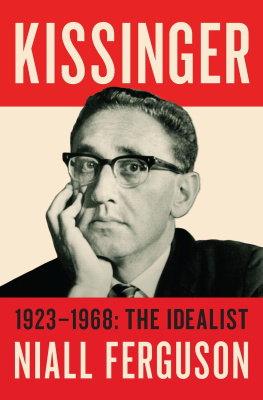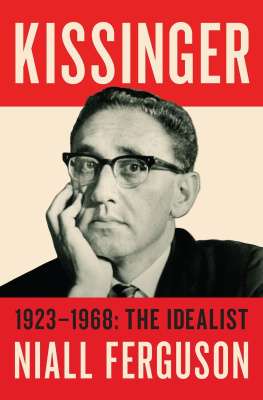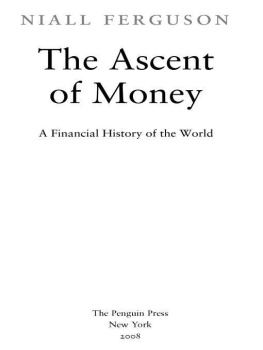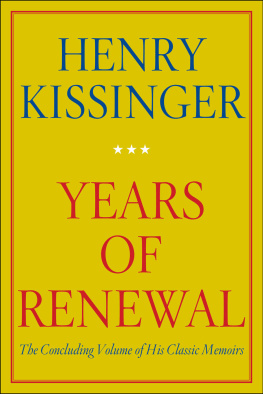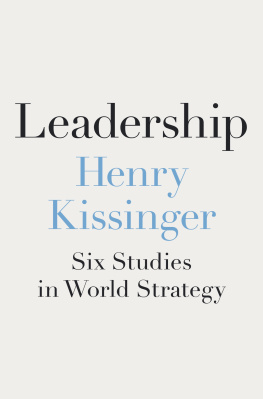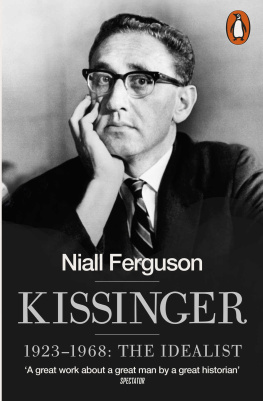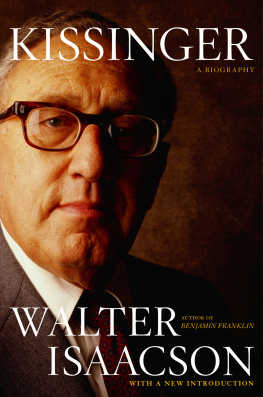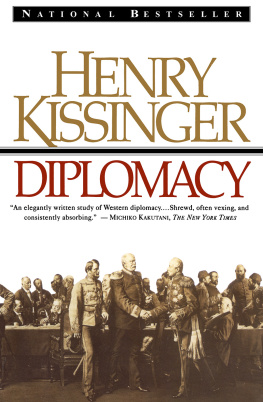Ferguson Niall - Kissinger. Volume 1, 1923-1968., The Idealist
Here you can read online Ferguson Niall - Kissinger. Volume 1, 1923-1968., The Idealist full text of the book (entire story) in english for free. Download pdf and epub, get meaning, cover and reviews about this ebook. City: New York;United States, year: 2016;2015, publisher: Penguin Publishing Group, genre: Art. Description of the work, (preface) as well as reviews are available. Best literature library LitArk.com created for fans of good reading and offers a wide selection of genres:
Romance novel
Science fiction
Adventure
Detective
Science
History
Home and family
Prose
Art
Politics
Computer
Non-fiction
Religion
Business
Children
Humor
Choose a favorite category and find really read worthwhile books. Enjoy immersion in the world of imagination, feel the emotions of the characters or learn something new for yourself, make an fascinating discovery.
- Book:Kissinger. Volume 1, 1923-1968., The Idealist
- Author:
- Publisher:Penguin Publishing Group
- Genre:
- Year:2016;2015
- City:New York;United States
- Rating:3 / 5
- Favourites:Add to favourites
- Your mark:
- 60
- 1
- 2
- 3
- 4
- 5
Kissinger. Volume 1, 1923-1968., The Idealist: summary, description and annotation
We offer to read an annotation, description, summary or preface (depends on what the author of the book "Kissinger. Volume 1, 1923-1968., The Idealist" wrote himself). If you haven't found the necessary information about the book — write in the comments, we will try to find it.
Kissinger. Volume 1, 1923-1968., The Idealist — read online for free the complete book (whole text) full work
Below is the text of the book, divided by pages. System saving the place of the last page read, allows you to conveniently read the book "Kissinger. Volume 1, 1923-1968., The Idealist" online for free, without having to search again every time where you left off. Put a bookmark, and you can go to the page where you finished reading at any time.
Font size:
Interval:
Bookmark:

A LSO BY N IALL F ERGUSON
The Great Degeneration
Civilization
High Financier
The Ascent of Money
The War of the World
Colossus
Empire
The Cash Nexus
The Pity of War
The House of Rothschild
Volume II: The Worlds Banker, 18491999
The House of Rothschild
Volume I: Moneys Prophets, 17981848
Paper and Iron
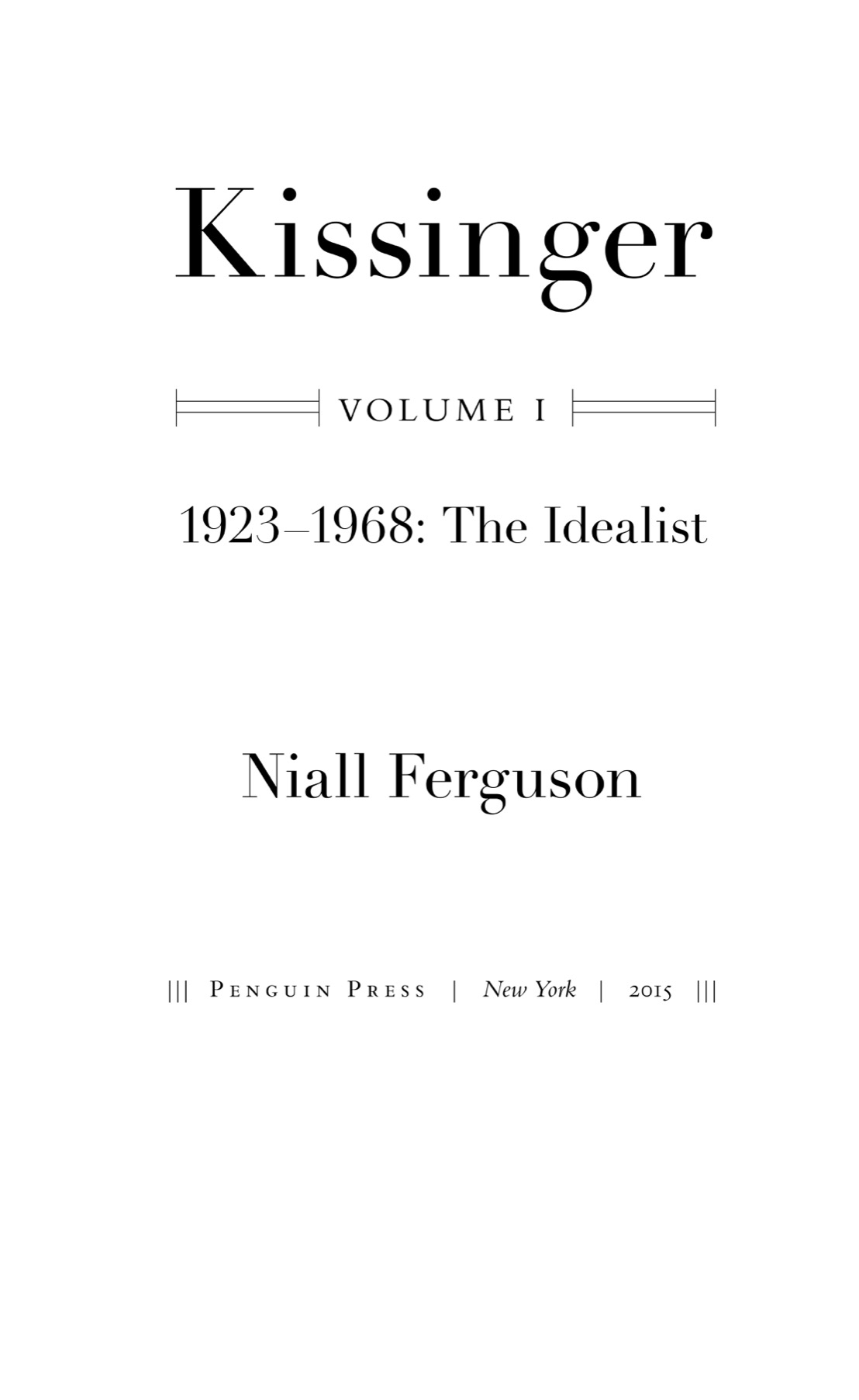
PENGUIN PRESS
An imprint of Penguin Random House LLC
375 Hudson Street
New York, New York 10014
penguin.com
Copyright 2015 by Niall Ferguson
Penguin supports copyright. Copyright fuels creativity, encourages diverse voices, promotes free speech, and creates a vibrant culture. Thank you for buying an authorized edition of this book and for complying with copyright laws by not reproducing, scanning, or distributing any part of it in any form without permission. You are supporting writers and allowing Penguin to continue to publish books for every reader.
Photograph credits appear .
ISBN 978-0-698-19569-1
Version_2
I N M EMORIAM
Gerald Harriss (19252014)
Karl Leyser (19201992)
Angus Macintyre (19351994)
Indeed I cannot conceive a more perfect mode of writing any mans life, than not only relating all the most important events of it in their order, but interweaving what he privately wrote, and said, and thought; by which mankind are enabled as it were to see him live, and to live oer each scene with him, as he actually advanced through the several stages of his life.... I will venture to say that he will be seen in this work more completely than any man who has ever yet lived. And he will be seen as he really was; for I profess to write, not his panegyrick, which must be all praise, but his Life.... [I]n every picture there should be shade as well as light.
B OSWELL , Life of Johnson
The task of the biographer, as James Boswell understood, is to enable the reader to see, in her minds eye, his subject live. To achieve this, the biographer must know his subject. That means reading all that he wrote as well as much that was written about him. It also means, if the subject is living, not merely interviewing him but getting to know him, as Boswell got to know Johnson: conversing with him, supping with him, even traveling with him. The challenge is, of course, to do so without falling so much under the subjects influence that the reader ceases to believe the disclaimer that the work is a life, not a panegyric. Boswell, who grew to love Johnson, achieved this feat in two ways: by making explicit Johnsons boorish manners and slovenly appearance, but also (as Jorge Luis Borges noted) by making himself a figure of funa straight man to Johnsons wit, an overexcitable Scot to Johnsons dry Englishman. My approach has been different.
In addition to the help of all those thanked in the acknowledgments, this author has had one noteworthy advantage over his predecessors: I have had access to Henry Kissingers private papers, not only the papers from his time in government, housed at the Library of Congress, but also the private papers donated to Yale University in 2011, which include more than a hundred boxes of personal writings, letters, and diaries dating back to the 1940s. I have also been able to interview the subject of the work on multiple occasions and at considerable length. Not only has this book been written with Henry Kissingers cooperation; it was written at his suggestion.
For this reason, I can predict with certainty that hostile reviewers will allege that I have in some way been influenced or induced to paint a falsely flattering picture. This is not the case. Although I was granted access to the Kissinger papers and was given some assistance with the arrangement of interviews with family members and former colleagues, my sole commitment was to make my best efforts to record [his] life as it actually was on the basis of an informed study of the documentary and other evidence available. This commitment was part of a legal agreement between us, drawn up in 2004, which ended with the following clause:
While the authority of the Work will be enhanced by the extent of the Grantors [i.e., Kissingers] assistance... it will be enhanced still more by the fact of the Authors independence; thus, it is understood and agreed that... the Author shall have full editorial control over the final manuscript of the Work, and the Grantor shall have no right to vet, edit, amend or prevent the publication of the finished manuscript of the Work.
The sole exception was that, at Dr. Kissingers request, I would not use quotations from his private papers that contained sensitive personal information. I am glad to say that he exercised this right on only a handful of occasions and always in connection with purely personaland indeed intimate familialmatters.
This book has been just over ten years in the making. Throughout this long endeavor, I believe I have been true to my resolve to write the life of Henry Kissinger as it actually waswie es eigentlich gewesen, in Rankes famous phrase (which is perhaps better translated as it essentially was). Ranke believed that the historians vocation was to infer historical truth from documentsnot a dozen documents (the total number cited in one widely read book about Kissinger) but many thousands. I certainly cannot count how many documents I and my research assistant Jason Rockett have looked at in the course of our work. I can count only those that we thought worthy of inclusion in our digital database. The current total of documents is 8,380a total of 37,645 pages. But these documents are drawn not just from Kissingers private and public papers. In all, we have drawn material from 111 archives all around the world, ranging from the major presidential libraries to obscure private collections. (A full list of those consulted for this volume is provided in the sources.) There are of course archives that remain closed and documents that remain classified. However, compared with most periods before and since, the 1970s stand out for the abundance of primary sources. This was the age of the Xerox machine and the audio tape recorder. The former made it easy for institutions to make multiple copies of important documents, increasing the probability that one of them would become accessible to a future historian. Nixons and Kissingers fondness for the latter, combined with the expansion of freedom of information that followed Watergate, ensured that many conversations that might never have found their way into the historical record are now freely available for all to read.
My motivation in casting the widest and deepest possible net in my trawl for material was straightforward. I was determined to see Kissingers life not just from his vantage point but from multiple vantage points, and not just from the American perspective but from the perspectives of friends, foes, and the nonaligned. Henry Kissinger was a man who, at the height of his power, could justly be said to bestride the world. Such a mans life requires a global biography.
I always intended to write two volumes. The question was where to break the story. In the end, I decided to conclude the first volume just after Richard Nixon announced to the world that Kissinger was to be his national security adviser, but before Kissinger had moved into his office in the West Wing basement and actually started work. There were two reasons for this choice. First, at the end of 1968 Henry Kissinger was forty-five years old. As I write, he is ninety-one. So this volume covers more or less exactly the first half of his life. Second, I wanted to draw a clear line between Kissinger the thinker and Kissinger the actor. It is true that Kissinger was more than just a scholar before 1969. As an adviser to presidents and presidential candidates, he was directly involved in the formulation of foreign policy throughout the 1960s. By 1967, if not before, he had become an active participant in the diplomatic effort to begin negotiations with the North Vietnamese government in the hope of ending the Vietnam War. Yet he had no experience of executive office. He was more a consultant than a true adviser, much less a decision maker. Indeed, that was former president Dwight Eisenhowers reason for objecting to his appointment. But Kissinger is a professor, he exclaimed when he heard of Nixons choice. You ask professors to study things, but you never put them in charge of anything.... Im going to call Dick about that. Kissinger was indeed a professor before he was a practitioner. It therefore makes sense to consider him first as what I believe he was before 1969: one of the most important theorists about foreign policy ever to be produced by the United States of America. Had Kissinger never entered government, this volume would still have been worth writing, just as Robert Skidelsky would still have had good reason to write his superb life of John Maynard Keynes even if Keynes had never left the courtyards of Cambridge for the corridors of power in His Majestys Treasury.
Font size:
Interval:
Bookmark:
Similar books «Kissinger. Volume 1, 1923-1968., The Idealist»
Look at similar books to Kissinger. Volume 1, 1923-1968., The Idealist. We have selected literature similar in name and meaning in the hope of providing readers with more options to find new, interesting, not yet read works.
Discussion, reviews of the book Kissinger. Volume 1, 1923-1968., The Idealist and just readers' own opinions. Leave your comments, write what you think about the work, its meaning or the main characters. Specify what exactly you liked and what you didn't like, and why you think so.

